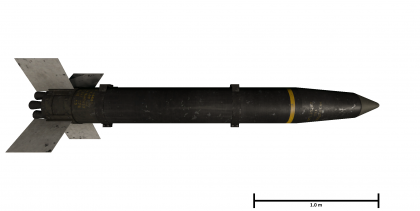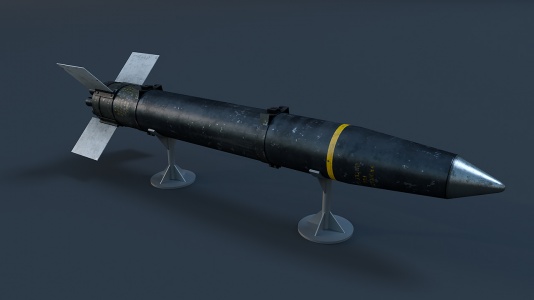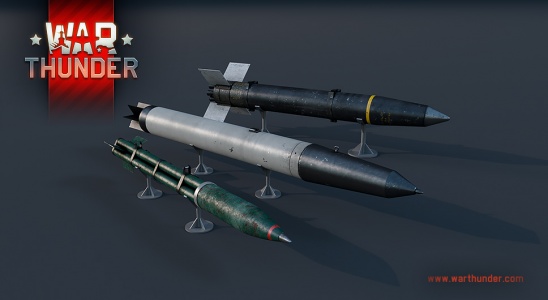Difference between revisions of "Uncle Tom"
(→Comparison with analogues) (Tag: Visual edit) |
Colok76286 (talk | contribs) (Edits) |
||
| Line 17: | Line 17: | ||
! colspan="2" | Rocket characteristics | ! colspan="2" | Rocket characteristics | ||
|- | |- | ||
| − | | '''Mass''' || | + | | '''Mass''' || 467 kg |
|- | |- | ||
| − | | ''' | + | | '''Maximum speed''' || 204 m/s |
|- | |- | ||
| − | | ''' | + | | '''TNT explosive mass''' || 51.25 kg |
|- | |- | ||
| − | | ''' | + | | '''Armour penetration''' || 91 mm |
|- | |- | ||
|} | |} | ||
| Line 29: | Line 29: | ||
=== Effective damage === | === Effective damage === | ||
<!-- ''Describe the type of damage produced by this type of rocket (high explosive, splash damage, etc)'' --> | <!-- ''Describe the type of damage produced by this type of rocket (high explosive, splash damage, etc)'' --> | ||
| − | A direct hit will destroy any tank or light pillbox, as each rocket carries | + | A direct hit will destroy any tank or light pillbox, as each rocket carries more than 50 kg of TNT. |
=== Comparison with analogues === | === Comparison with analogues === | ||
| − | The Uncle Tom rockets are a bit less powerful than the Tiny | + | <!-- ''Give a comparative description of rockets that have firepower equal to this weapon.'' --> |
| + | * [[Tiny Tim]] rocket - The Uncle Tom rockets are a bit less powerful than the American Tiny Tims, with 10 kg less TNT. They also weigh less than Tiny Tims (467 vs 534 kg) but fly slower at 204 m/s (vs 274 m/s for Tiny Tims). | ||
| + | * [[Red Angel]] rocket - Having a similar weight (478 kg), the British Red Angel has around 10 kg less TNT than the Uncle Tom rocket. It flies almost twice faster at 390 m/s and can penetrate up to 168 mm armour. | ||
== Usage in battles == | == Usage in battles == | ||
| Line 43: | Line 45: | ||
'''Pros:''' | '''Pros:''' | ||
| − | * | + | * Large explosive warhead |
'''Cons:''' | '''Cons:''' | ||
| − | * | + | * The heavy weight impacts the flight performance of the carrier and limits the number of carried rockets |
| + | * The flight speed is slow | ||
== History == | == History == | ||
Revision as of 13:19, 29 December 2021
Contents
Description
Write an introduction to the article in 2-3 small paragraphs. Briefly tell us about the history of the development and combat using the weaponry and also about its features. Compile a list of air, ground, or naval vehicles that feature this weapon system in the game.
Vehicles equipped with this weapon
General info
| Rocket characteristics | |
|---|---|
| Mass | 467 kg |
| Maximum speed | 204 m/s |
| TNT explosive mass | 51.25 kg |
| Armour penetration | 91 mm |
Effective damage
A direct hit will destroy any tank or light pillbox, as each rocket carries more than 50 kg of TNT.
Comparison with analogues
- Tiny Tim rocket - The Uncle Tom rockets are a bit less powerful than the American Tiny Tims, with 10 kg less TNT. They also weigh less than Tiny Tims (467 vs 534 kg) but fly slower at 204 m/s (vs 274 m/s for Tiny Tims).
- Red Angel rocket - Having a similar weight (478 kg), the British Red Angel has around 10 kg less TNT than the Uncle Tom rocket. It flies almost twice faster at 390 m/s and can penetrate up to 168 mm armour.
Usage in battles
Uncle Tom rockets are fired one at a time, and not in pairs like smaller rockets. They are, in practice, not very different from Air-to-ground guided missiles found in high tier vehicles when fired without guidance, and can be used as such against lightly armoured targets with ease. However, they are a bit difficult to aim, and may be challenging to use effectively against heavy and even many medium tanks. When scoring a direct hit, though, these rockets are very rewarding. They are veritable bombs that can be aimed. A hit in the general proximity of an SPAA will destroy the ground vehicle due to overpressure and splash damage.
Pros and cons
Summarise and briefly evaluate the weaponry in terms of its characteristics and combat effectiveness. Mark pros and cons as a list.
Pros:
- Large explosive warhead
Cons:
- The heavy weight impacts the flight performance of the carrier and limits the number of carried rockets
- The flight speed is slow
History
Examine the history of the creation and combat usage of the weapon in more detail than in the introduction. If the historical reference turns out to be too long, take it to a separate article, taking a link to the article about the weapon and adding a block "/History" (example: https://wiki.warthunder.com/(Weapon-name)/History) and add a link to it here using the main template. Be sure to reference text and sources by using <ref></ref>, as well as adding them at the end of the article with <references />.
Media
- Images
See also
Links to the articles on the War Thunder Wiki that you think will be useful for the reader, for example:
- reference to the article about the variant of the weapon;
- references to approximate analogues by other nations and research trees.
External links






